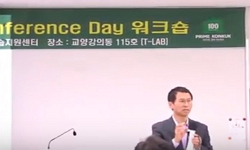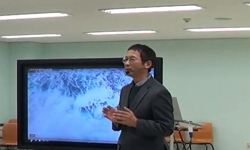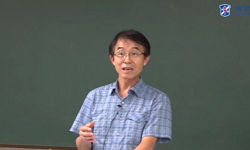From the perspective of smart learning space, this study aims to take a look at the learning space of college students who do online remote learning in the COVID-19 era, and analyze their demands on what smart learning space they want. Furthermore, th...
http://chineseinput.net/에서 pinyin(병음)방식으로 중국어를 변환할 수 있습니다.
변환된 중국어를 복사하여 사용하시면 됩니다.
- 中文 을 입력하시려면 zhongwen을 입력하시고 space를누르시면됩니다.
- 北京 을 입력하시려면 beijing을 입력하시고 space를 누르시면 됩니다.

스마트 학습공간 발전을 위한 대학생들의 요구 분석 = Analysis of University Students' Needs for Developing Smart Lerning Spaces
한글로보기https://www.riss.kr/link?id=A107106739
- 저자
- 발행기관
- 학술지명
- 권호사항
-
발행연도
2020
-
작성언어
Korean
- 주제어
-
등재정보
KCI등재
-
자료형태
학술저널
- 발행기관 URL
-
수록면
13-23(11쪽)
-
KCI 피인용횟수
0
- DOI식별코드
- 제공처
-
0
상세조회 -
0
다운로드
부가정보
다국어 초록 (Multilingual Abstract)
From the perspective of smart learning space, this study aims to take a look at the learning space of college students who do online remote learning in the COVID-19 era, and analyze their demands on what smart learning space they want. Furthermore, this study intends to provide valuable implications for the technology-enhanced learning environments by deriving design elements that make up the university's smart learning space. To achieve these goals, we conducted a review of prior studies, interviews with experts, and case analysis on smart learning spaces of major Korean and foreign universities, which are considered as innovative cases. Additionally, in order to confirm the difference between the importance level recognized by the college students and the current performance level for nine components of technology and for ten components of spaces and facilities, a paired t-test and an Importance-Performance Analysis (IPA) were carried out. According to the result of IPA analysis, Internet of Things from the technological aspects, a desk that can supply power and a flexible learning space from the aspects of spaces and facilities were found to have much lower performance than the importance. This result is meaningful in suggesting key design components for smart campus development in the post-COVID-19 world.
참고문헌 (Reference)
1 신화경, "재택근무 희망 근로자의 재택 근무 공간 특성에 대한 선호 연구" 12 (12): 87-95, 2001
2 박태정, "이러닝 환경에서의 감성적 어포던스 설계원리 개발" 서울대학교 대학원 2015
3 곽도영, "원하면 코로나 끝나도 무기한 재택근무 …‘근로 뉴 노멀’ 맞는 기업들"
4 박기호, "스마트워크의 원격근무방식이 기대효과에 미치는 인과관계 : 한국과 네팔 기업 간 비교연구" 878-890, 2014
5 김현주, "스마트러닝 기반 협력적 문제해결 수업모형 개발: 설계기반연구" 한국교육공학회 30 (30): 651-677, 2014
6 최민아, "스마트교육 개념에 의한 초등학교 학습 공간의 특성 연구" 한국기초조형학회 15 (15): 417-428, 2014
7 나종연, "스마트 캠퍼스 문헌고찰을 통한 프레임워크 개발 및주요 이슈 분석" 한국디지털정책학회 14 (14): 19-31, 2016
8 김도기, "미래학교의 개념 및 공간 설계의 방향 탐색" 교육연구원 35 (35): 119-146, 2019
9 남창우, "대학교육에서 스마트 교실 환경 변인이 대학생의 멀티미디어 활용태도 및 협력적 학습태도에 미치는 영향" 학습자중심교과교육학회 20 (20): 111-131, 2020
10 강인애, "‘스마트 러닝’의 개념화와 교수학습전략 탐색: 대학에서의 활용을 중심으로" 한국교육방법학회 24 (24): 283-303, 2012
1 신화경, "재택근무 희망 근로자의 재택 근무 공간 특성에 대한 선호 연구" 12 (12): 87-95, 2001
2 박태정, "이러닝 환경에서의 감성적 어포던스 설계원리 개발" 서울대학교 대학원 2015
3 곽도영, "원하면 코로나 끝나도 무기한 재택근무 …‘근로 뉴 노멀’ 맞는 기업들"
4 박기호, "스마트워크의 원격근무방식이 기대효과에 미치는 인과관계 : 한국과 네팔 기업 간 비교연구" 878-890, 2014
5 김현주, "스마트러닝 기반 협력적 문제해결 수업모형 개발: 설계기반연구" 한국교육공학회 30 (30): 651-677, 2014
6 최민아, "스마트교육 개념에 의한 초등학교 학습 공간의 특성 연구" 한국기초조형학회 15 (15): 417-428, 2014
7 나종연, "스마트 캠퍼스 문헌고찰을 통한 프레임워크 개발 및주요 이슈 분석" 한국디지털정책학회 14 (14): 19-31, 2016
8 김도기, "미래학교의 개념 및 공간 설계의 방향 탐색" 교육연구원 35 (35): 119-146, 2019
9 남창우, "대학교육에서 스마트 교실 환경 변인이 대학생의 멀티미디어 활용태도 및 협력적 학습태도에 미치는 영향" 학습자중심교과교육학회 20 (20): 111-131, 2020
10 강인애, "‘스마트 러닝’의 개념화와 교수학습전략 탐색: 대학에서의 활용을 중심으로" 한국교육방법학회 24 (24): 283-303, 2012
11 Kim, Y., "Towards emotionally aware AI smart classroom : Current issues and directions for engineering and education" 6 : 5308-5331, 2018
12 Graham, R., "The global state of the art in engineering education" Massachusetts Institute of Technology (MIT) 2018
13 Beichner, R. J., "The Student-Centered Active Learning Environment for Undergraduate Programs (SCALE-UP) Project" APS 2011
14 Nam, T., "Smart city as urban innovation: Focusing on management, policy, and context" 185-194, 2011
15 APKM, "Smart campus guidelines-draft report"
16 Grant, J. S., "Selection and use of content experts for instrument development" 20 (20): 269-274, 1997
17 Alexi Marmot, A., "Promoting space efficiency in building design" Space Management Group 107-, 2006
18 Radcliffe, D., "Learning spaces in higher education: Positive outcomes by design" University of Queensland 9-16, 2008
19 Lee, J. W. Y., "Learning spaces around the university:Factors that affect the preferences for a space" Universitat Politècnica de València 21-23, 2017
20 Oblinger, D., "Leading the transition from classrooms to learning spaces" 1 : 7-12, 2005
21 Martilla, J. A., "Importance-Performance Analysis for Developing Effective Marketing Strategies" 41 (41): 77-79, 1977
22 Mizokami, S., "Deep active learning" Springer 79-91, 2018
23 Mizokami, S., "Deep active learning" Springer 79-91, 2018
24 Nie, X., "Constructing smart campus based on the cloud computing platform and the internet of things" Atlantis Press 2013
25 Atif, Y., "Building a smart campus to support ubiquitous learning" 6 (6): 223-238, 2015
26 Norman, G. R., "Biostatistics : the bare essentials" PMPH USA 2008
27 Crampton, J. W., "Beyond the geotag : situating ‘big data’and leveraging the potential of the geoweb" 40 (40): 130-139, 2013
28 Villegas-Ch, W., "Application of a Big Data Framework for Data Monitoring on a Smart Campus" 11 (11): 5552-, 2019
동일학술지(권/호) 다른 논문
-
장애대학생 교육복지지원 시설·설비부문의 개선방안에 대한 연구
- 한국교육시설학회
- 민경석
- 2020
- KCI등재
-
버클리대학의 도서관 사례로 보는 대학도서관 실내공간의 설계방향 연구
- 한국교육시설학회
- 이재훈
- 2020
- KCI등재
-
- 한국교육시설학회
- 안은희
- 2020
- KCI등재
-
- 한국교육시설학회
- 남정민
- 2020
- KCI등재
분석정보
인용정보 인용지수 설명보기
학술지 이력
| 연월일 | 이력구분 | 이력상세 | 등재구분 |
|---|---|---|---|
| 2023 | 평가예정 | 계속평가 신청대상 (계속평가) | |
| 2022-12-01 | 평가 | 등재후보로 하락 (재인증) |  |
| 2019-01-01 | 평가 | 등재학술지 선정 (계속평가) |  |
| 2018-01-01 | 평가 | 등재후보학술지 유지 (계속평가) |  |
| 2017-12-01 | 평가 | 등재후보로 하락 (계속평가) |  |
| 2013-01-01 | 평가 | 등재학술지 유지 (등재유지) |  |
| 2010-01-01 | 평가 | 등재학술지 선정 (등재후보2차) |  |
| 2009-01-01 | 평가 | 등재후보 1차 PASS (등재후보1차) |  |
| 2008-01-01 | 평가 | 등재후보학술지 유지 (등재후보1차) |  |
| 2007-01-01 | 평가 | 등재후보학술지 유지 (등재후보1차) |  |
| 2006-01-01 | 평가 | 등재후보 1차 FAIL (등재후보2차) |  |
| 2005-01-01 | 평가 | 등재후보 1차 PASS (등재후보1차) |  |
| 2003-07-01 | 평가 | 등재후보학술지 선정 (신규평가) |  |
학술지 인용정보
| 기준연도 | WOS-KCI 통합IF(2년) | KCIF(2년) | KCIF(3년) |
|---|---|---|---|
| 2016 | 0.33 | 0.33 | 0.43 |
| KCIF(4년) | KCIF(5년) | 중심성지수(3년) | 즉시성지수 |
| 0.41 | 0.36 | 1.002 | 0.05 |




 ScienceON
ScienceON






